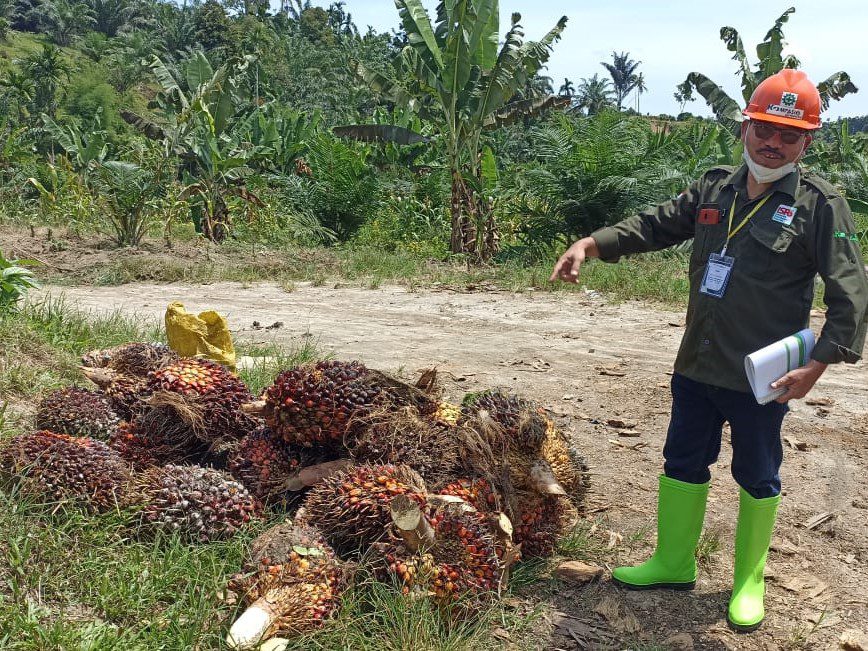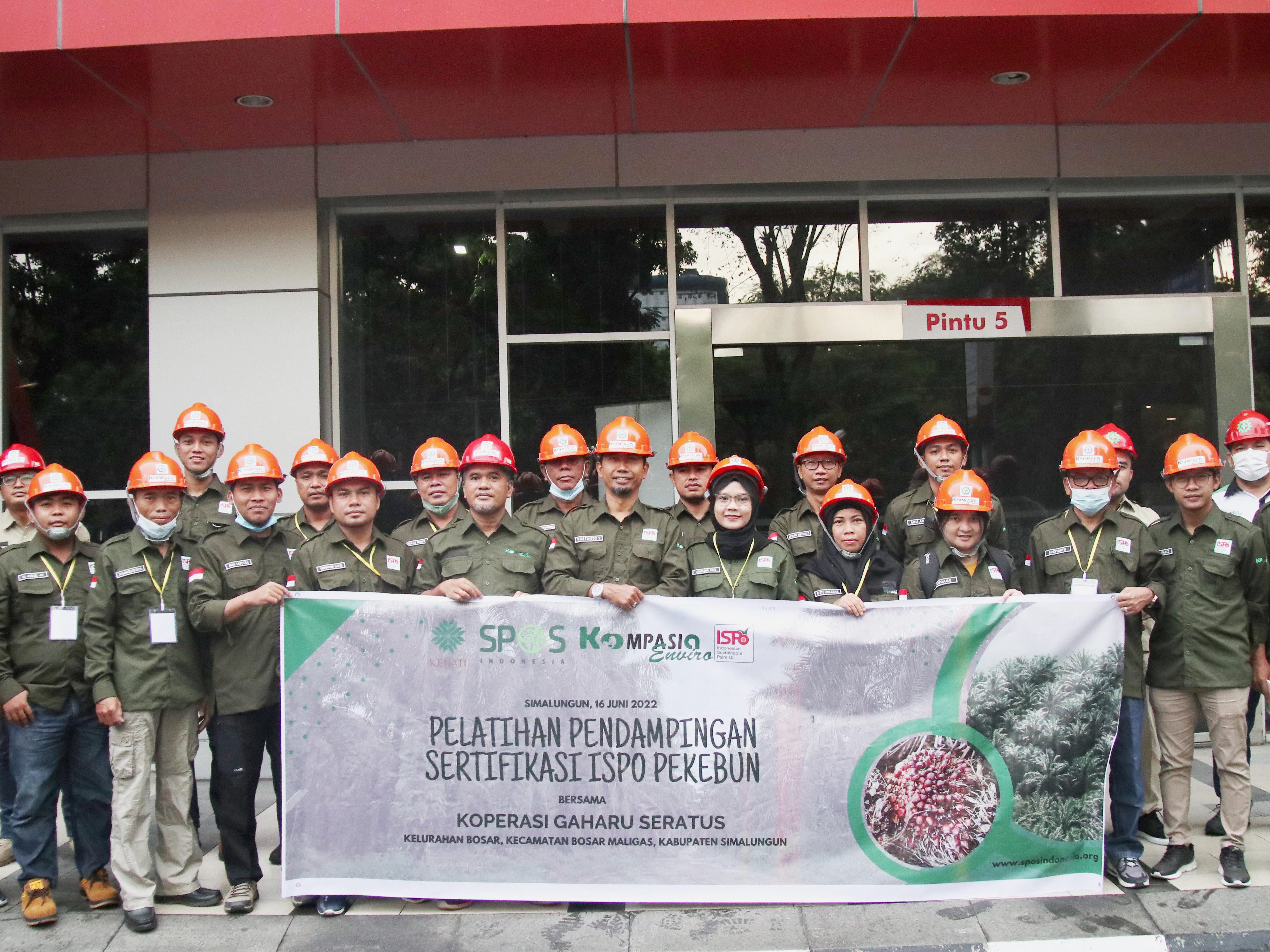ISPO AND THE PROBLEMS PALM OIL FARMERS FACE

-
Date:
12 Jan 2023 -
Author:
KEHATI
The demand for consumer goods, including palm oil, rises in sync with the growth of global population. Apart from soybean and sunflower oil, palm oil is required for a variety of household purposes.
Palm oil is widely used in many products such as cosmetics, cleaners, food, pharmaceuticals, and biofuels. Palm oil is less costly, so it is in high demand on the international market. The primary barrier to satisfying the high market demand is the plantation system which devastates the forest ecosystem.
The Highest Production Rate, The Most Efficient.
As cited by SPOS Indonesia KEHATI Program Manager Rostanto Suprapto, the USDA (United States Department of Agriculture) published data showing that in 2017, there were 276.6 million hectares of cropland used to produce vegetable oil. Rostanto Suprapto is the program manager for SPOS Indonesia’s KEHATI initiative. The amount of oil palm land in this area is the smallest, at 8%. With 45% of the market, soybean comes in front, followed by conola (13%), and sunflower seeds (9%).
But still, despite having the smallest plantation area, palm oil accounts for 32% of all vegetable oil production globally (202 million MT). Soybean comes in second with 29%, followed by conola with 16%, and sunflower seeds with 9%. This indicates that when compared to other kinds of vegetable oil, palm oil manufacturing is the most effective.
The situation on the global market is consistent with the rising production of palm oil. There was a 7 million MT increase in demand between 2013 and 2017. Palm oil made up the largest share of the 202 million tons of vegetable oils consumed globally, followed by soybeans (27.5%), canola (13.2%), and sunflower seeds (9.6%).
Oil Palm Plantations are Blamed for Deforestation.
Forests are critical for biodiversity and the preservation of climate and water quality. Deforestation reduces forest area, increases the risk of hydrometeorological disasters, and damages water resource systems. It can cause food problems in the long run due to decreased soil fertility and erosion.
This has sparked international interest. As a result, European countries require palm oil products to bear a “deforestation-free” certificate. Multinational corporations such as Unilever have begun implementing an internal “Responsible Sourcing Policy,” which focuses on efforts to reduce environmental impacts.
The largest producer of palm oil in the world, according to Rostanto, is Indonesia, which produces 51.6 million tonnes (2021 statistics) of the total global demand. Indonesia must therefore adhere to these countries’ environmental regulations.
Rostanto also provided information on the connection between oil palm and Indonesian job issues. Almost 4 million direct jobs and 12 million indirect jobs are supported by the oil palm industry.
Through the Mandatory Biodiesel B-30 program, palm oil also enhances energy security. A program using renewable energy sources and 879 palm oil mills with a capacity of 38,908 tons of Fresh Fruit Bunches (FFB) per hour have increased production levels by 8,591,368.23 kl in 2020. As much as 23.5 MWh of power can be produced from 500 tons of FFB each hour. Hence 1,828.68 MWh of electric power might potentially be produced overall.
ISPO Regulation.
In terms of consumption and economic income, oil palm plantations provide numerous benefits to human life. However, the government issued Presidential Regulation No. 44 of 2020 concerning the Indonesian Sustainable Palm Oil (ISPO) Certification System in order to reduce the negative impact of palm oil production. The ISPO regulation represents Indonesia’s commitment to resolving the negative issues associated with Indonesian palm oil.
Beginning in 2025, all business actors, including farmers, will be required to apply ISPO. The establishment of a new round of oil palm plantations in Indonesia with the issuance of Presidential Regulation No. 44 of 2020 concerning ISPO and Minister of Agriculture Regulation No. 38 of 2020 concerning Implementation of Certification of sustainable oil palm plantations is anticipated to comply with the sustainability principles desired by the global market.

It is crucial for Indonesia to comprehend the challenges surrounding vegetable oil and make an attempt to establish ISPO on the international market. Indonesia, as the world’s largest producer of palm oil, must anticipate the trend of selective policies from Europe and America.
According to Rostanto, ISPO’s guiding principle is the establishment of economically, socially, and environmentally feasible oil palm plantations. Fulfilling the legal aspects of plantation land and cultivation, as well as implementing GAP (Good Agriculture Practices) and handling B3 waste (hazardous and toxic materials), as well as financing ISPO preparations and audits, are the challenges in implementing the mandatory ISPO scheme.
“A number of oil palm plantations are illegal because they are located in forest areas. The majority of the land has not been certified, and some has an uncertain status. There are still many palm oil businessmen whose legal status is unknown. “Many farmers are still not registered,” Rostanto explained.
ISPO standards apply to all palm oil businesses, both corporate and individual. Farmers have a five-year grace period until 2025.
With restrictions on land legality and business entities, KEHATI’s challenge is to start preparing farmers to meet ISPO certification standards.
